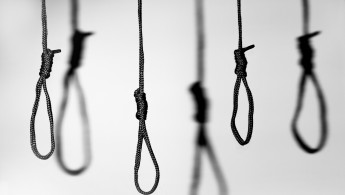Iran executed 834 people last year, highest since 2015: rights groups
Iran executed at least 834 people last year, the highest number since 2015, as capital punishment in the Islamic republic surged to a "staggering" level, human rights groups said on Tuesday.
The number of executions, which Iran has always carried out by hanging in recent years, was up some 43 percent on 2022.
It marked only the second time in two decades that more than 800 executions were recorded in a year, after 972 executions in 2015, Norway-based Iran Human Rights (IHR) and Paris-based Together Against the Death Penalty (ECPM) said in the joint report.
The groups accused Iran of using the death penalty to spread fear during its crackdown on protests sparked by the September 2022 death in police custody of Kurdish Iranian woman Mahsa Amini.
"Instilling societal fear is the regime's only way to hold on to power, and the death penalty is its most important instrument," said IHR director Mahmood Amiry-Moghaddam in the report, which described the figure of 834 as a "staggering total".
ECPM director Raphael Chenuil-Hazan added: "There is an instrumentalisation of the death penalty in Iran by the regime in order to fight against the protests."
Iran has executed nine men in cases linked to attacks on security forces during the 2022 protests – two in 2022, six in 2023 and one so far in 2024 – according to the rights groups.
There has also been a rise in executions on other charges, notably in drug-related cases, which had previously seen a fall.
"Of particular concern is the dramatic escalation in the number of drug-related executions in 2023, which rose to 471 people, more than 18 times higher than the figures recorded in 2020," said the report.
Members of ethnic minorities, particularly the largely Sunni Muslim Baluch community from the southeast of Iran, are "grossly overrepresented amongst those executed" on drug-related charges, it said.
At least 167 members of the Baluch minority were executed last year, accounting for 20 percent of the total, even though the community accounts for only around five percent of mainly Shia Iran's population.
'Wrong signal'
Chenuil-Hazan deplored a "lack of reaction" by the United Nations Office on Drugs and Crime (UNODC) to the surge in drug-related executions, saying the agency was deepening rather than cutting its cooperation with the Iranian authorities.
Most hangings in Iran are carried out within the confines of prisons but the report said that in 2023 the number of hangings carried out in public in Iran more than tripled from 2022, with seven people hanged in public spaces.
At least 22 women were executed, marking the highest number in the past decade, the report said.
Fifteen of them were hanged on murder charges and NGOs have long warned that women who kill an abusive partner or relative risk being hanged.
One man was executed in April on charges of adultery, the first time a person was hanged on these charges since 2009, it said. In May, two men accused of desecrating the Quran were executed on blasphemy charges, the first such executions in nine years.
In 2023, only 15 percent of the recorded executions were announced by Iranian official media, with IHR confirming the other executions through its own sources.
Human rights groups regard Iran as the world's biggest executioner after China, for which no data is available but which is widely believed to execute several thousand people every year.
With global attention focused on Israel's war on Gaza, Amiry-Moghaddam expressed concern that a lack of international outrage at the executions was only encouraging the Islamic republic to carry out more hangings.
"Unfortunately this reaction has been lacking, especially in the second half of 2023," he told a news conference.
"When the political cost of the executions is not high, the numbers increase."
So far in 2024, Iran has executed at least 83 people, according to IHR's figures.
"I am afraid we will be facing more executions unless the international community shows a stronger reaction," Amiry-Moghaddam said.





 Follow the Middle East's top stories in English at The New Arab on Google News
Follow the Middle East's top stories in English at The New Arab on Google News

![MP Essam Diab's pursuit to block TikTok in Egypt has revived an already ongoing debate in the country. [Getty]](/sites/default/files/styles/image_330x185/public/1230748046.jpeg?h=a5f2f23a&itok=-8MqBLLC)
